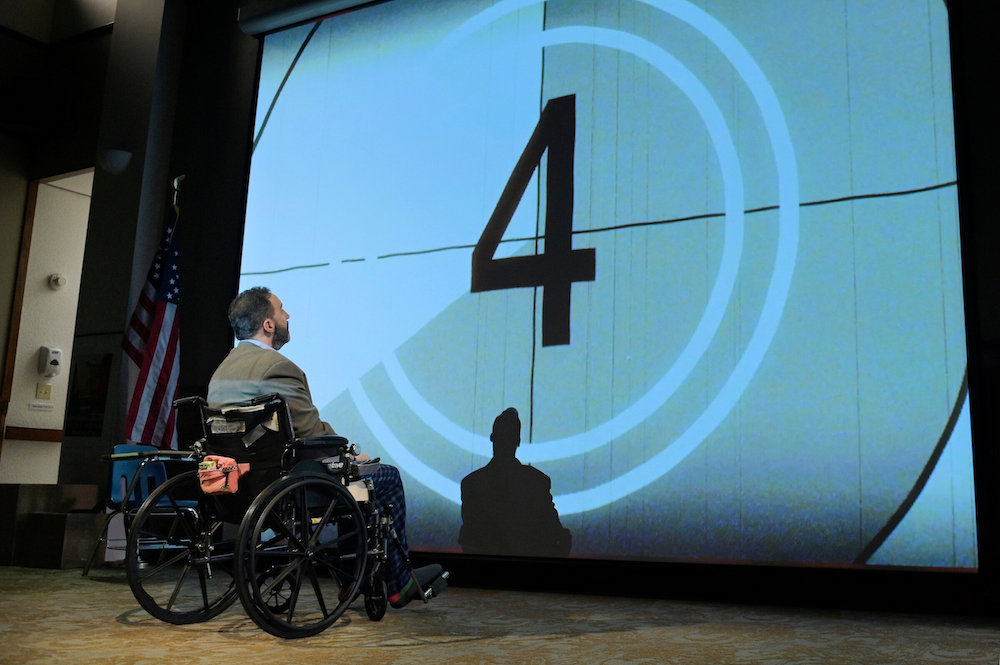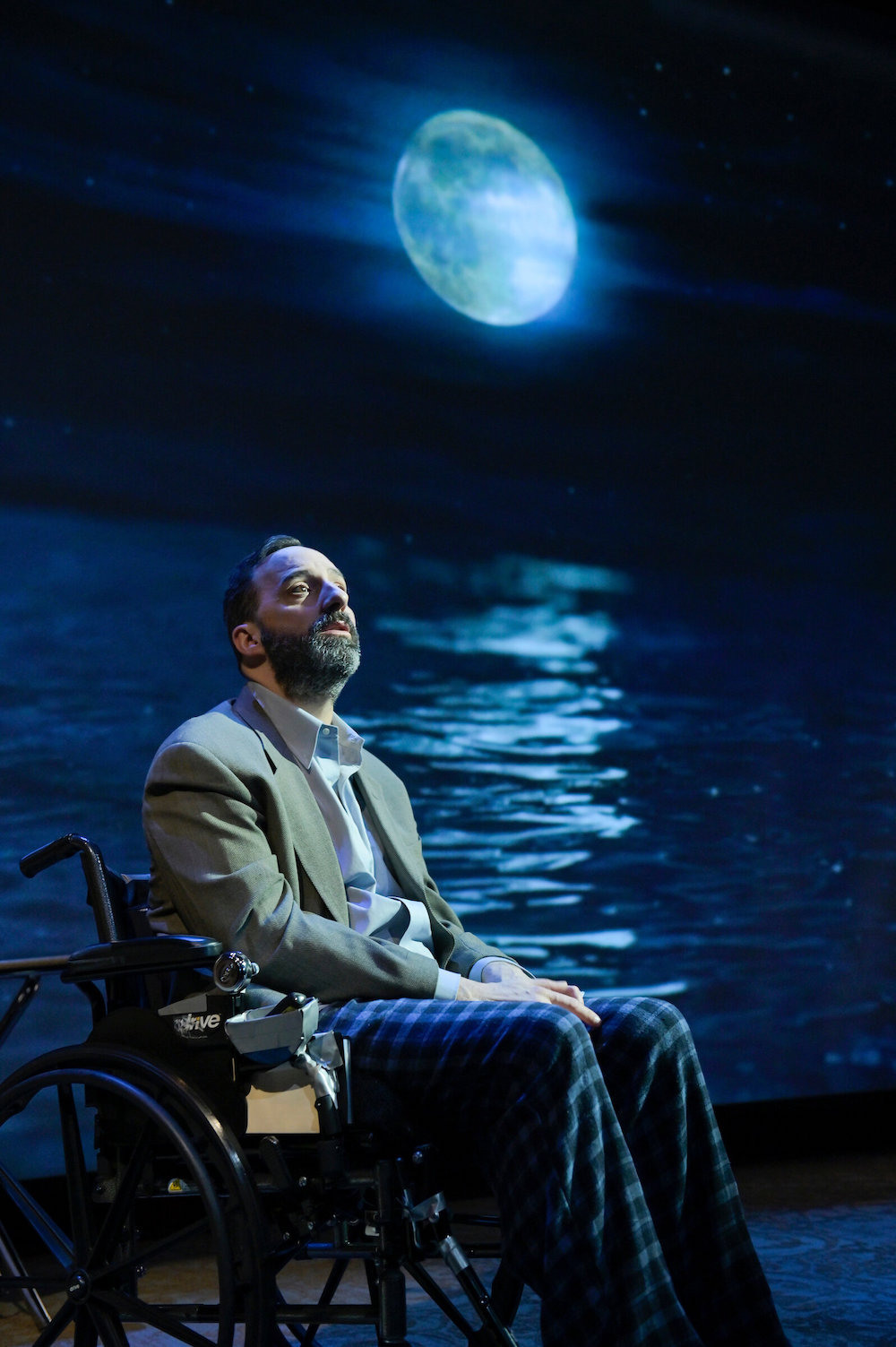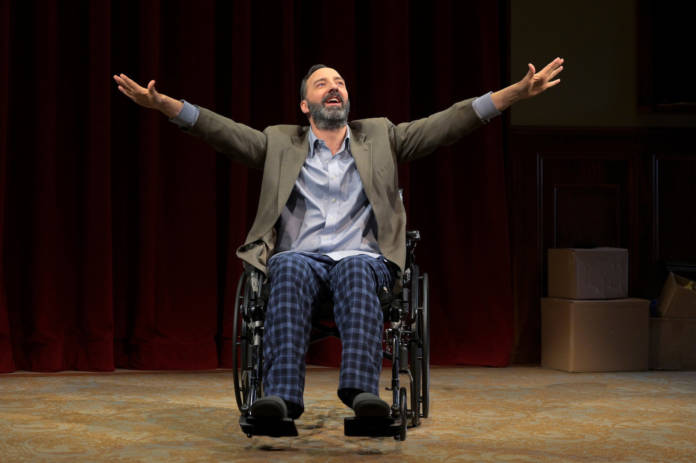What do you look for when you want to go see a show? Some recommendations, perhaps, but definitely a little information on what it’s about, right?
For months, I’ve been frustrated by the cloud of obscurity surrounding Wakey, Wakey (at ACT Geary Theatre through February 16). The two sure things: It stars Tony Hale, the hilariously lugubrious oddball Emmy-winner from Arrested Development and Veep. And the Will Eno-penned play won an Obie in New York. (Yes, the Times review was equally vague.) Beyond that it was all gauzy phrases, like “a remarkable combination of the extraordinary and the everyday that invites you to share the pleasure, humor, and beautiful mystery of life,” and a baffling promo video of Hale cutting up with the production team.
Most great plays can’t be boiled down to plot points, fine, and trusting new artistic director Pam MacKinnon, who’s so far delivered a pleasantly cerebral season at ACT, isn’t very difficult. But all signs pointed to Wakey, Wakey being a “stunt play,” one for which you simply can’t reveal the core secret. These can be brilliant (see: the incredible Slave Play, which just closed on Broadway) or terrible (“it was a dream all along!”).
I’m happy to report that Wakey, Wakey is both a stunt play and brilliant. It’s also pretty description-proof. The best thing about it could be how Eno toys with our expectation of a “reveal”—what is really going on here?—delivering instead a swerve from the hallucinatory to the briefly maudlin to the miraculous. Wakey, Wakey, directed by Anne Kauffman, somehow captures the way we feel and speak in this era of a zillion mediating screens and second-guesses. It wields sincerity, briefly, as a weapon (what are we more afraid of in this age of self-branding but looking too earnest?), but values all the tricks we use to seem above it all.

Not to give too much away: We’re introduced to Hale (“Guy”) in a wheelchair, delivering a sort of fractured lecture that veers between New Age-y and nihilistic, philosophical and frivolous, overthought and undercooked, aphasic (he stumbles over the words a lot) and poetic (Eno knows how to leave us hanging with multiple meanings).
Things are said, then unsaid. Facts are refuted as they’re being described. The audience is directly acknowledged and implicated—or is it? The play has a lot of fun keeping us on our toes about who, exactly, is being spoken to. We participate when called upon—at one point Guy leads us on a group exercise meant to rewire the gratitude part of our brains—then wonder if we just got gently suckered, manipulated with our own theatrical expectations. Thanks, buddy.
In short, we’re in a kind of uncanny hyperreality, with a creeping sense that there’s a larger trauma being described. It’s a trope out of Pinter and Beckett—and, with the entrance of a mysterious visitor, we get a bit of Kushner—but Eno’s use of contemporary technological and cultural references, and Hale’s engrossing performance, make it timely. Hale guides us personably through a shattered perspective, the circumstances of which begin to coalesce for those who listen closely (Leah Gelpe’s sound design is an essential part of this play) but are ultimately ungraspable.

While we’re trying to figure out what’s happening, building emotional meaning from clues and cues, the events onstage reflect how our minds are working—including wondering when it will all be over. (The play lasts only 75 very quick minutes.) This kind of thing could be cloyingly meta, but a humane tenderness in the face of the inevitable suffuses everything with purpose. Eno’s language is always reaching for the positive, the possible. And when the ending does comes, we realize we’ve known what was going to happen all along. A glorious affirmation.
That’s all I’lll say—now I’m the vague one!—other than a brief curtain-raiser, The Substitution, a tartly funny piece written by Eno and commissioned by ACT, features the fantastic Kathryn Smith-McGlynn alongside students from ACT’s MFA program and sets up Wakey, Wakey perfectly, right down to a pen dropped accidentally on the floor.
WAKEY, WAKEY
Through February 16
ACT Geary Theatre, SF.
More info here.





